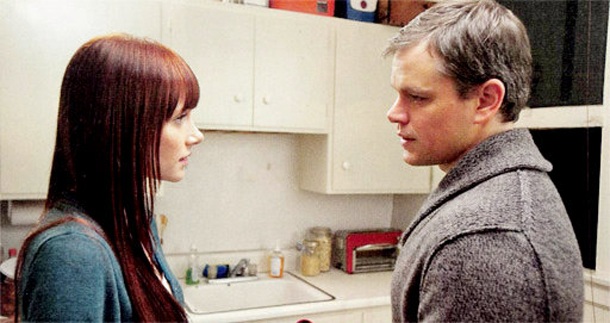Ever since my mom died, Dad talks a lot about Heaven. When the time comes, he hopes to see my mother there. I hope so too, of course. I don't believe it. But I can always hope. And at least I know that there is a place where Heaven is real. I've seen it many times, in the movies. Because in the magical world of the movies, you can sell any load of bullshit you want.
The latest pile arrives today in the form of director Clint Eastwood's new movie, Hereafter. The tale of a reluctant psychic (Matt Damon) and a French television host (Cecile de France) would like to pose as an exploration of loss and the quest for the divine. But Hereafter hardly qualifies as thought-provoking. Comforting bullshit is pretty much all there is to it.
Damon plays George Lonegan, a retired psychic with the kind of gift rarely seen outside of a screenplay. His pushy brother Billy (Jay Mohr) wants him to get back into the business so they can make some coin. But George wants only to be left alone to have a normal life -- attempts at romance tend to go sour when simply holding your date's hand tells you that she was sexually abused by her father. Awkward. Meanwhile Lonegan is being stalked by a determined client -- a troubled young boy who lost his twin brother in an accident.
De France plays TV host Marie Lelay, en vacance a Thailand on Dec. 26, 2004. She's shopping for trinkets when the big tsunami hits. Lelay already has a foot in Heaven when she is whisked back to Earth thanks to the intervention of two good samaritans. But she's been changed by the experience. Her producer boyfriend suggests she take a leave of absence to write that book about Francois Mitterand she's been planning. Imagine her poor publisher's surprise when the book turns out to be an exploration of the afterlife instead. Marie's producer boyfriend doesn't believe in the afterlife. So it's no surprise that he's a smug, superficial, fickle two-timer. What do you expect? The man doesn't even believe in Heaven.
When directors go towards the light
Heaven is an irresistible honey trap for filmmakers. It's the ultimate test of the imagination. If you saw The Lovely Bones, you know it's a test filmmakers often fail. Peter Jackson used CGI to create a series of inspirational poster cliches (e.g. a giant rose blooming under an icy lake). 1998's What Dreams May Come attempted something similar. Hereafter does not go far down that road, at least -- Eastwood's afterlife is merely shown as a shadowy plain full of blurry people, like a big, dry cocktail party with no snacks. This movie is more concerned with painting a reassuring picture of our enduring connection with the dead. "The evidence is irrefutable," a hospice doctor tells Marie. And it is -- in the movies. As played out here, the afterlife debate resembles a political panel on Fox News.
The movie covers its bases by acknowledging that shysters are out there, offering up a parade of psychic charlatans for our derision. But this is the pot calling the kettle black. Hereafter is just as guilty of peddling bogus revelation as the mirror-gazers and phony seers it claims to mock.
There's certainly nothing wrong with using cinema to explore the eternal mysteries. My personal favourite movie Heaven comes from Afterlife. In that 1998 Japanese film, the recently deceased spend a week choosing a single memory they will inhabit for all eternity. It's a beautiful idea, and it's used to tell a story about the nature of life and relationships. Good movies can do that. But that's not Hereafter. Hereafter has nothing genuine to say. It's just a pretentious reiteration of Ghost without the murder mystery or the cool black shadows that drag evildoers to Hell. Offered up as an affirmation of eternal love, Hereafter is actually cheap and cynical. If you're going to make a movie about death and grief, shouldn't it contain some truth? Shouldn't it say something real about the uncertainty and doubt and deep longing that survivors experience? Instead, Hereafter just gives us a magical dude offering simple answers to unanswerable questions. Utterly pointless.
Clint's heavy boot
With each passing film, Eastwood's 1992 masterpiece Unforgiven seems more and more miraculous. In movies like Hereafter, The Changeling and Million Dollar Baby, he fills the screen with cartoonish supporting characters and pounds home his points with drippy music. Give him this much -- Eastwood is one director who is resisting the 3-D craze. His cardboard characters couldn't support it.
I'm all for hope. I sincerely hope that when the time comes (and not too soon) my father will cross over the beautiful river and see his true love waiting. Meanwhile here on Earth, I sincerely hope that Hollywood's quota of "serious" movies will include something other than this type of emotional sugar high. In my movie Heaven, there will be no more cheap, pandering flicks like Hereafter. Amen. ![]()
Read more: Film
















Tyee Commenting Guidelines
Comments that violate guidelines risk being deleted, and violations may result in a temporary or permanent user ban. Maintain the spirit of good conversation to stay in the discussion.
*Please note The Tyee is not a forum for spreading misinformation about COVID-19, denying its existence or minimizing its risk to public health.
Do:
Do not: